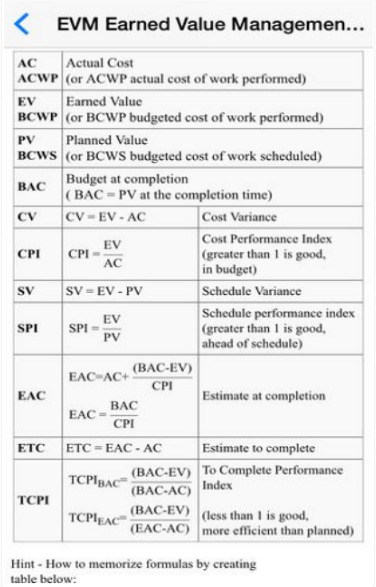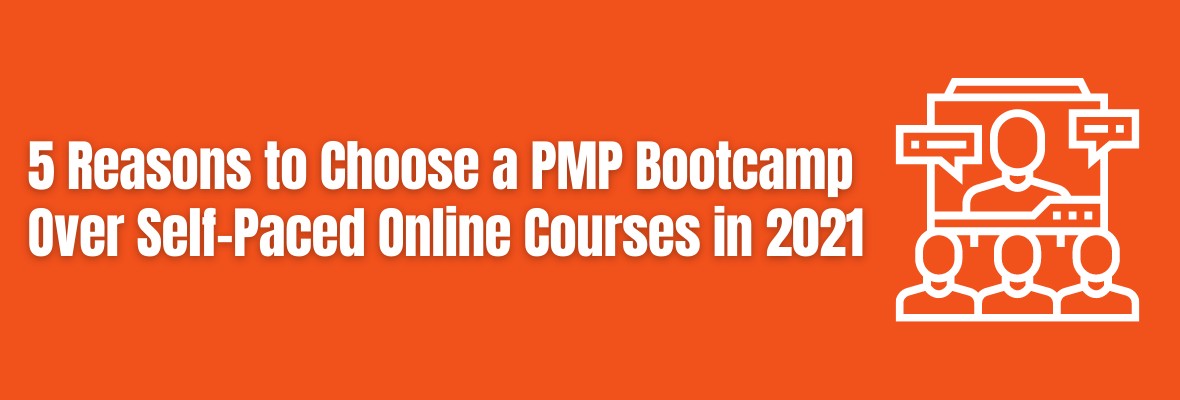5 Reasons to Choose a PMP Bootcamp Over Self-Paced Online Courses in 2021
Congratulations! If you are reading this, you’ve probably decided to take the plunge and earn your PMP Certification. However, you know nothing about the PMP bootcamp let alone when and how to take it and your PMP exam prep leaves something to be desired.
Let’s start by answering the following: what is PMP Certification? Project Management Institute (PMI) offers what is known PMP--Project Management Professional Certification or Project Management Certification, which is valid across the globe. Currently, there are about half a million active PMP certified professionals worldwide.
PMI has predicted that by 2027, the project management-oriented labour force will grow by 33% in seven project-oriented sectors. This means nearly 22 million new jobs in need of 88 million individuals ready, able, and willing to take on project management-oriented roles. The demand, then, for project managers is high and this demand exists within a variety of industries.
PMP Bootcamp OR Self-Paced Online Courses?
Should you pursue the PMP bootcamp or do a self-paced online course? Let’s go over what each entails.
PMP Bootcamp will cover all areas required for PMP and for your exam—nothing more and nothing less. Not only does this save a lot of time and energy; it also gives you a chance to focus on the details required to exceed. As an added bonus, you also get plenty of interaction with other like-minded individuals who are also working towards completing their exam.
Successfully completing a self-paced online course depends entirely on the individual. He/She must be disciplined enough to discern what they need to study and how to go about studying. Because the study materials are left up to the individual to choose, self-paced online courses can be risky, especially since the material chosen may not align well with PMP. There’s also a bigger probability to procrastinate, which can delay your certification.
Ultimately, you want to understand the appropriate concepts necessary to master PMP. Because of this, the bootcamp is probably your best option since it’s designed specifically for the successful completion of the exam. Mock exams are offered; if taken, you will gain invaluable information regarding your strengths and weaknesses, especially since it is designed to feel like an actual exam. The bootcamp also prepares you to apply PMP knowledge to real-life projects in any industry.
Which option do you think I picked when faced with this section’s opening question? PMP Bootcamp, of course. With the help of PMP Bootcamp, I was able to clear my PMP exam in the first attempt! While I have a feeling that what I’ve already laid out is enough to convince you of the better option, read on for five more reasons why you should choose PMP exam prep bootcamps over self-paced online courses.
5 Reasons PMP Exam Prep Bootcamps Are Better Than Self-Paced Courses
.jpg)
1. Unique Study Plan-Based Learning: There are two types of Bootcamps:
- Traditional, live, in-person bootcamp, which may be expensive but is more efficient.
- The online bootcamp, which can be done from anywhere.
Both focus on the innovative result-oriented study. This approach relies on unique methodology that allows the students to get the best of their training and exam. Because bootcamp content is prepared by experts, a lot of thought goes into the content. Questions like “what topics need to be covered” and “to what extent” are often asked to help produce adequate substance. A systematic learning plan filled with sequences that make it easier to grasp concepts is the result.
This approach helps establish a wholistic program geared towards giving you a wholistic understanding of your PMP certification training. One will enjoy this unique study plan, which has been tailored to suit your requirements. As I mentioned earlier, the study plan covers precisely what you need to know – nothing less and nothing more!!
2. Full-Length Simulated Exams: This is a big plus in my opinion. As in most bootcamps, PMP bootcamp will give you one or more full-length simulated exams. These help the student and teacher analyze where the student stands and what extra areas need focus. These practice exams also help reduce anxiety during the actual exam by training your body to sit for long durations and training your mind to be active for many hours. Practice helps reduce exhaustion that may otherwise occur during the real exam. Think of it as training for marathon: you will probably do many practice runs before the official marathon. In short, simulated exams help save time, money, and energy, allowing you this to experience what the actual exam will entail.
3. Interactive Sessions with Industry Experts: The PMP Bootcamp trainer is usually an industry expert well versed in the experience of other industry experts. He may be associated with a local PMI Chapter or be part of different forums. By taking the bootcamp, you get a chance to soak up his wisdom. Believe it or not, this is just the half of it! As a bootcamp participant, you get a chance to interact with various experts from a plethora of fields because they’ll be attending the bootcamp with you. This gives you a good chance to gain insight into their industry and how PMP can be widely used. Your interaction with industry experts will also help you gain understanding as to how PMP can be applied to real-life applications. Who knows: there’s always a chance that some experts may choose to pair up with you for group preparation! Interactive sessions let you dive into many new windows of thought and best of all, you gain experience from each lap you swim.
4. In-Depth Training with Workbooks and Cheat Sheets: PMBOK book is an important tool to use while studying for your PMP certification. While it touches upon many concepts, some are not explained in detail (examples include Critical Chain Method, Expected Monetary Value). To put it bluntly, it takes some time to get the “hang” of PMBOK. The book mentions a few tools and techniques, but elaboration is null (e.g. project selection criteria, QFD, and a few others).

Source: Pinterest
Thankfully, PMP bootcamp provides in-depth training and worksheets to help you get the details PMBOK lacks. It is imperative that you remember the names of all process groups, processes, and other knowledge areas. Of course, it’s even better if you can recall these quickly and accurately. Tips and cheat sheets about such concepts as the brain dump are shared, helping you recall information effortlessly.
PMP brain dump strategy acts as a catalyst for computer-based tests. The strategy consists of using the first few minutes at the beginning of the exam to write down important notes; this information acts as a quick reference for the rest of the exam. Your aim is to avoid confusion. This strategy reduces the time taken to answer questions, helping you answer more questions correctly and even eventually enter a “state of flow” during the exam. PMP brain pump can prove to be a boon throughout the exam, especially during the second half, when your attention levels tend to decrease.
5. Emphasis on Active Learning & Business Skill Improvement: We all know that communication is important, especially for a project manager. However, there are other business skills that are equally important, especially for the PMP aspirant. Active learning is one way forward. Bootcamp will teach you how to handle difficult employees and manage people. You will learn how to deal with sudden change of plans and get deep insight in Stakeholder Management. Other critical project management skills bootcamp teaches include preventing internal conflicts, managing quality, and taking care of triple constraint (scope, time, cost and quality). The basics of planning and leadership are insurmountable skills learned during bootcamp.
Frequently Asked Questions
1. Are PMP Bootcamps worth it?
Yes, PMP bootcamps are worth the 4 to 5 days of investment. These sessions, geared towards your success, are packed with information easily applied at work. Bootcamp helps you prepare and ultimately pass the PMP Exam in minimum time and with smart effort. Consider PMP Exam prep as parallel to job training, especially when considering its worth and how much it can help you.
2. What is a PMP Bootcamp?
Project Management Professional (PMP) Bootcamp provides a convenient and quick approach to PMP certification. You will gain the knowledge required to pass the PMP exam. It will also give you education hours required for certification. As mentioned earlier in this article, there are two types:
- In-person bootcamps which may be costly but are more efficient.
- Online bootcamps which can be taken from anywhere.
3. Is the PMP exam changing in 2021?
Project management professionals need diverse approaches and skills. To meet these needs, the PMP certification exam will change starting January 2nd, 2021. The exam will focus on three new domains:
People: Focus is on how to effectively lead a project team
Process: Emphasis on technical aspects for managing any project
Business Environment: Highlights the connection between organization strategy and projects selected.
The new exam is comprised of:
- 180 questions (previously 200 questions). However, scoring will be for same number of questions.
- 230 minutes for exam completion
- Will include additional break for computer-based tests. So, two 10-minute breaks. There will be no breaks for paper-based exams.
- Questions will be a combination of multiple responses, matching, multiple-choice, hotspot, and limited fill-in-the-blanks.
4. What are the prerequisites for the PMP exam?
PMP certification requirements: High school diploma or associate’s degree, or a global equivalent
- 5 years (60 months) of professional project management experience (non-overlapping)
- 7,500 hours directing and leading projects.
- 35 hours of formal education in project management (PMP Bootcamp covers this)
5. Do PMP Bootcamps work?
Bootcamps generally provide an accelerated path of study. Interruptions are distractions for those doing PMP Exam prep. These distractions, like email, phone calls, and social media, get in the way of quality studying.
Bootcamps address these issues:
- The lack of a firm time and strict commitment to study typically results in altering schedules for study and exams. Bootcamps help divert these interruptions.
- Having made a financial investment in a bootcamp which has a firm schedule is quite effective. It assures that you remain focused and on schedule for preparation and exam.
So, bootcamps really work and ensure your success taking the exam.
Conclusion
PMP Bootcamp helps ensure you have more tail winds than head winds to clear your PMP exam. All the above benefits clearly indicate that a bootcamp helps you pass the exam early. Now, if you decide to do a self-learning training, you may probably spend anywhere between six months to a year studying to take and pass the PMP exam. If your aim is to pass the PMP exam in a short time, a bootcamp is the best way to achieve success.
Bootcamps are designed to provide 35 contact hours of project management training. These are a prerequisite for the PMP examination. They typically are from three to five days, making for a good and concentrated study period.
Want to Crack the PMP Certification Exam in One Go? Sign Up for a PMP Bootcamp Today!
